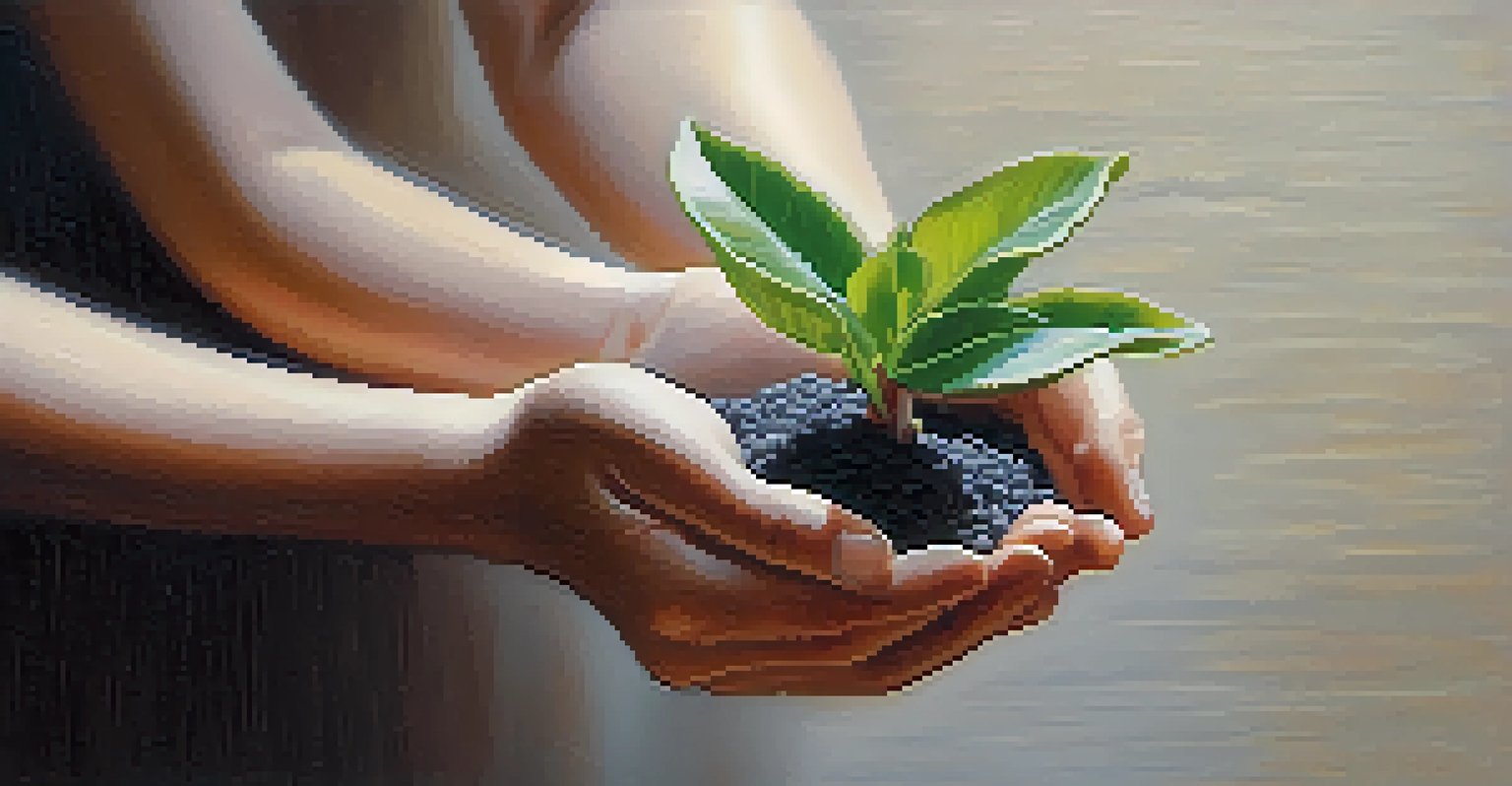Self-Compassion and Its Role in Enhancing Charitable Giving

Understanding Self-Compassion and Its Importance
Self-compassion is the practice of treating oneself with kindness and understanding during difficult times. Rather than harsh self-criticism, it encourages a gentle approach to our flaws and failures. This mindset helps foster resilience, making it easier to face life’s challenges without being overwhelmed by negativity.
You are imperfect, you are wired for struggle, but you are also worthy of love and belonging.
Imagine a friend who comforts you when you're down; that’s the essence of self-compassion. It’s about recognizing that everyone struggles and that imperfection is part of being human. This perspective not only alleviates personal distress but can also inspire a generous spirit towards others.
When we cultivate self-compassion, we become more emotionally available and empathetic. This emotional openness is crucial, especially when it comes to understanding and connecting with the needs of those around us.
The Link Between Self-Compassion and Empathy
Empathy is the ability to understand and share the feelings of others, and self-compassion plays a vital role in enhancing this quality. When we are kind to ourselves, we’re more likely to extend that kindness to others. This creates a cycle of understanding that enriches our relationships and fosters a sense of community.

For example, when we acknowledge our own struggles, we can relate better to the hardships faced by others. This shared understanding can motivate us to take action in support of those in need. Essentially, self-compassion lays the groundwork for a more empathetic outlook on life.
Self-Compassion Fuels Empathy
Practicing self-compassion helps us relate to others' struggles, enhancing our ability to empathize and support them.
As empathy grows, so does our motivation to contribute to charitable causes. We start to see the importance of helping others not just as a duty, but as a natural extension of our compassionate selves.
How Self-Compassion Encourages Generosity
Self-compassion encourages us to take a step back and recognize our privilege and resources. When we appreciate what we have, we often feel a deeper urge to share with those less fortunate. This realization can lead to increased charitable giving.
No one can make you feel inferior without your consent.
Think of self-compassion as a mirror reflecting our values. When we see our own worth and understand our capacity for kindness, we're more inclined to act generously. It transforms our perspective from one of scarcity to abundance.
Moreover, generous acts fueled by self-compassion are often more meaningful. They stem from a genuine desire to help rather than obligation, making the experience fulfilling for both the giver and the recipient.
Barriers to Charitable Giving and How Self-Compassion Helps
Many people face barriers to charitable giving, such as feelings of inadequacy or the belief that their contributions won’t make a difference. Self-compassion can dismantle these barriers by promoting a mindset of acceptance and encouragement. Instead of focusing on what we lack, we learn to appreciate what we can offer.
For instance, someone might think, 'I can only give a little, so why bother?' However, self-compassion reminds us that every act, no matter how small, is valuable. It nurtures the understanding that collective efforts can lead to significant change.
Generosity Comes from Self-Kindness
When we appreciate our own worth, we are more inclined to share our resources and support those in need.
By overcoming self-judgment and embracing a compassionate view, we feel empowered to contribute in ways that align with our values and capabilities. This shift in perspective can lead to a more active role in charitable initiatives.
The Role of Awareness in Promoting Self-Compassion
Awareness is a crucial first step in cultivating self-compassion. By recognizing our thoughts and feelings without judgment, we create an environment where self-kindness can flourish. Mindfulness practices, such as meditation, can foster this awareness and help us better understand our emotional responses.
For example, taking a moment to pause and reflect when feeling overwhelmed can shift our focus from self-criticism to self-acceptance. This simple act of awareness can significantly alter our approach to both ourselves and our willingness to help others.
When we become aware of our feelings, we’re better equipped to respond with compassion, not just toward ourselves, but toward those around us. This awareness can ultimately lead to a greater commitment to charitable giving.
Practical Ways to Cultivate Self-Compassion
Cultivating self-compassion doesn’t have to be complicated. Simple practices such as journaling about your feelings, speaking kindly to yourself, or even engaging in self-care activities can make a big difference. These practices encourage a healthier relationship with oneself, paving the way for a more compassionate outlook.
Consider setting aside time each week to reflect on your achievements and what you appreciate about yourself. This can help counteract negative self-talk and reinforce your self-worth. With a solid foundation of self-compassion, charitable actions become a natural extension of who you are.
Charitable Giving Enhances Well-Being
Engaging in charitable acts not only benefits others but also boosts our own happiness and sense of purpose.
Moreover, surrounding yourself with supportive people can enhance your self-compassion journey. Sharing your experiences and listening to others can create a nurturing community that inspires collective charitable efforts.
The Impact of Charitable Giving on Personal Well-Being
Interestingly, engaging in charitable giving can also enhance our own well-being. When we help others, we often experience a boost in happiness and fulfillment. This reciprocal relationship between giving and self-compassion creates a positive feedback loop that benefits both the giver and the receiver.
For instance, participating in community service or donating to a cause can provide a sense of purpose and belonging. This enhanced well-being can further reinforce our self-compassion, making us feel more connected and less isolated.

Ultimately, the act of giving encourages us to appreciate our own lives while positively impacting others. This symbiotic relationship not only fosters a spirit of generosity but solidifies the importance of self-compassion in our lives.